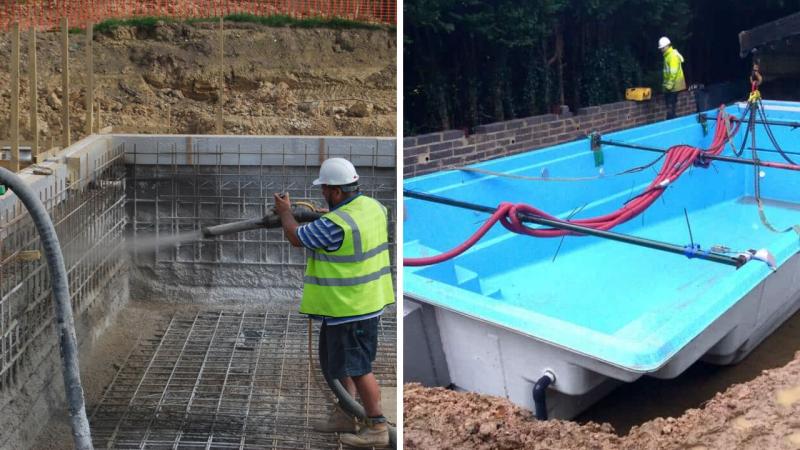Concrete vs. Fiberglass Swimming Pool: Which Is Better?

When deciding to install a concrete vs fibreglass pool in your backyard, choosing between a concrete or fiberglass pool is a major decision. Both materials have their own pros and cons, making one more suitable for some homeowners than the other. In this article, we'll explore the key differences between concrete and fiberglass pools to help you make an informed choice.
Concrete Pools: Strength and Customization
Advantages:
Complete Customization: One of the most significant benefits of concrete pools is the unlimited design potential. Concrete allows for a pool of any shape, size, or depth, making it the best choice for homeowners who have a specific vision.
Durability: Concrete is incredibly strong and long-lasting. Properly maintained, a concrete pool can last for decades, standing up well to harsh weather and heavy use.
Material Versatility: You can finish the surface of a concrete pool with different materials, such as tile, plaster, or aggregate, to create a unique look.
Disadvantages:
Long Installation Time: Concrete pools take significantly longer to install, often 3 to 6 months, because of the complexity of the construction process.
Higher Maintenance: Concrete pools require regular maintenance to keep them in good condition. The surface can develop algae and needs to be brushed frequently. Resurfacing is also required every 10 to 15 years.
Cost: Concrete pools are generally more expensive upfront due to the labor and customization involved.
Fiberglass Pools: Fast and Low Maintenance
Advantages:
Quick Installation: Fiberglass pools are prefabricated, meaning they come in a mold and can be installed in just a few weeks. This makes them a great option if you're looking for a fast turnaround.
Low Maintenance: The smooth surface of a fiberglass pool resists algae, making it easier to maintain. You won’t have to worry about resurfacing like you would with concrete pools.
Comfort and Flexibility: Fiberglass pools have a smooth, non-porous surface that’s gentle on your feet and skin. Many models come with built-in seating and steps, adding to the convenience and comfort.
Disadvantages:
Limited Customization: Unlike concrete, fiberglass pools come in predefined shapes and sizes. While there are many options, your customization ability is limited to what’s available from the manufacturer.
Size Limitations: Since fiberglass pools are delivered as a single piece, transportation can limit their size. If you want a larger or uniquely shaped pool, fiberglass might not be the best option.
Higher Initial Cost: Though fiberglass pools save money on maintenance, they can be more expensive upfront compared to concrete pools, depending on the manufacturer and installation process.
Which Is Better?
There’s no definitive answer to which pool type is better—it ultimately depends on your priorities and preferences.
Choose a Concrete Pool if you value complete customization and long-term durability. It’s ideal if you want a pool that can be tailored exactly to your backyard and vision, and you're willing to invest time and money in maintenance.
Choose a Fiberglass Pool if you’re looking for a faster installation, lower maintenance, and a smooth, user-friendly surface. It’s perfect for those who prefer convenience and are satisfied with pre-designed options.
Final Thoughts
Both concrete and fiberglass pools have their own unique benefits and drawbacks. Your decision should be based on your specific needs, budget, and long-term plans. Take time to weigh the pros and cons of each option before diving into your pool project.
Post Your Ad Here
Comments